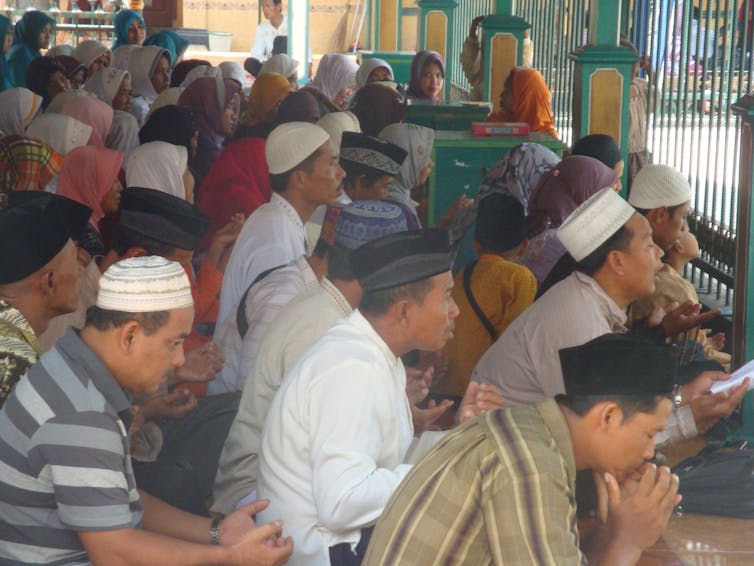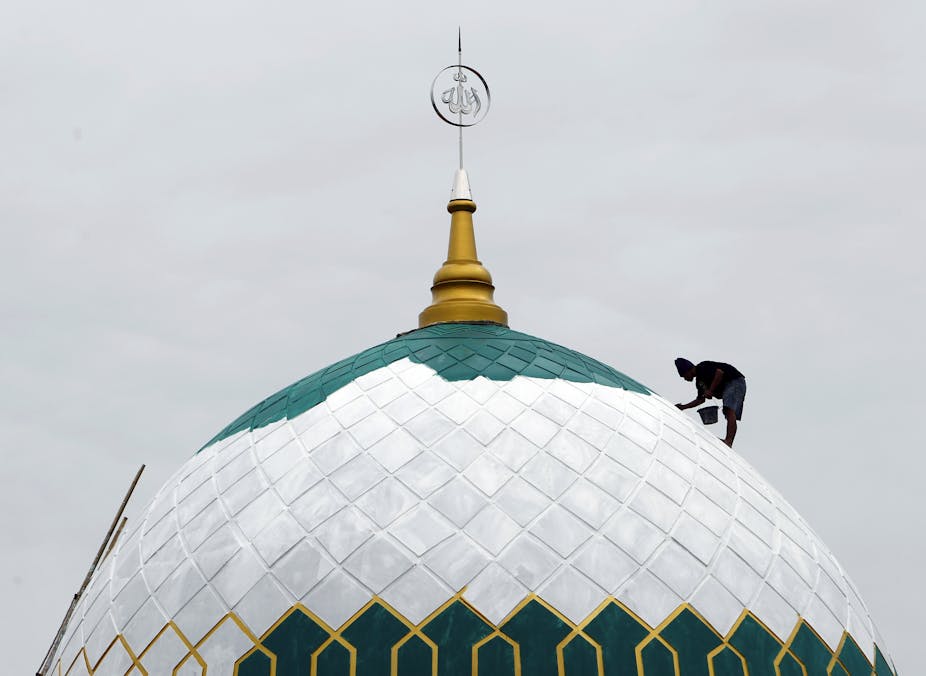After a lull of more than six years, Indonesia’s capital Jakarta was once again been hit by a deadly terror attack. This one was apparently mounted by a number of individuals believed to be connected with the so-called Islamic State (IS), in a tradition that emerged with the 2002 Bali bombings: violent attacks by terrorist cells operating in Indonesia, but claiming links with global militant Islamist organisations.
The almost immediate outpouring of defiant messages and hashtags in the social media condemning this latest atrocity points at the presence of a robust counter narrative shared by the vast majority of Indonesian Muslims. They want to preserve the plurality of what is alternately referred to as Indonesia’s brand of “cultural”, “civil” or “cosmopolitan” Islam.
Historically, Indonesia has been no stranger to religiously inspired political violence, but it tended to be a domestic phenomenon.
In the 19th century, Islam played a role in resisting increasingly invasive Dutch colonialism. After independence was declared in 1945, Indonesia was confronted with an armed insurgence by the Darul Islam (DI) movement in West Java.
A breakaway from the main Islamic party, the Masyumi Party, the DI rejected the latter’s agenda of gradually Islamising Indonesia by democratic means and instead aimed to establish a full-fledged Islamic state. From 1948 until 1962 it challenged the central government, which tried to safeguard the plurality of the country’s multi-ethnic and religious demographic make-up through the so-called Pancasila or “five principles” doctrine, encompassing the territorial integrity of Indonesia, humanitarianism, social justice, democracy and the requirement of every Indonesian citizen to believe in a single supreme being.
As far as the DI was concerned, this last principle – which included the acceptance of Islam, Catholicism, Protestantism and Hindu-Buddhism as state-acknowledged religions – did not go far enough in affirming the Islamic identity of a majority Muslim country.
After losing a protracted armed confrontation with the central government, the DI uprising was defeated in 1962. However, remnants of DI went underground, and pockets of like-minded extremists with international connections have surfaced occasionally over the ensuing decades. But for now at least, homegrown violent Islamism nonetheless remains mostly a fringe movement, and the idea of religious pluralism has essentially endured ever since.
The massive mainstream
To this day, tens of millions of Indonesians are members of the country’s two Islamic mass organisations: the modernist-reformist Muhammadiyah and traditionalist Nahdlatul Ulama (NU), which have both operated legally in Indonesia since their foundation in late colonial times. They are both larger and older than their counterparts elsewhere, including the Muslim Brotherhood in Egypt and Pakistan’s Jamaat-e-Islami.
Focused on the emancipation of Indonesia’s Muslims through education and religious propagation, Muhammadiyah and NU continue to shape a pluralist Indonesian Islam which is sensitive to the country’s complex social, cultural and political settings.

Both organisations played a key role in the dramatic regime change of 1998-99, which ended more than 40 years of autocratic rule under first Sukarno and then Suharto. NU leader Abdurrahman Wahid subsequently became the country’s first democratically elected president, while Muhammadiyah leader Amien Rais became speaker of the People’s Consultative Assembly.
The sudden opening up of Indonesian society also led to the emergence of an array of Islamic political parties. But, unlike the popular individual leaders of Islamic mass organisations, these parties didn’t perform well. In the four national elections since 1999, their share of the vote has hovered at around 30%.
Islamist splinter parties have also failed in their attempts to introduce Islamic law into the country’s national legal system due to a lack of support from the larger Muslim parties associated with the Muhammadiyah or NU. They think the new constitution offers adequate protection for the religious rights of all Indonesians.
Islamist politicians developed different tactics to further Islamise Indonesia. These included taking advantage of the devolution of powers to regional and local authorities as part of the decentralisation of government administration. This has resulted in the passing of religious bylaws, imposing – largely symbolic – aspects of Islamic law in certain puritan Muslim regions and localities.
On the edge
A more serious challenge to Indonesia’s cultural Islam came in the form of a fatwa in the summer of 2005. Issued by the Indonesian Council of Religious Scholars (MUI), it condemned the concepts of secularism, pluralism and liberalism as “un-Islamic”.
Combined with a “conservative turn” in the top echelons of the Muhammadiyah, and to some extent also the NU, reactionary Muslim politicians felt vindicated for their increasingly intolerant attitudes towards Indonesia’s cultural Islam. Islamist vigilante organisations used it as a license to persecute and even kill people they considered “deviants” – members of Indonesia’s tiny shia minority, or of the Ahmadiyyah Movement.
The fault lines of this intra-Muslim polarisation became clear when progressive Muslims responded with a “Declaration of Indonesianess”. Issued on Pancasila Day 2006, it rejected the fatwa as being in conflict with principles enshrined in the constitution and Pancasila doctrine. The declaration advocates a measured secularisation of the political process and the protection of religious plurality and toleration.
Against the background of indecisive government and hesitant law enforcement, the contest between progressive and reactionary Muslims over society, ideas and values has become edgier. But while isolated extremists occasionally succeed in inflicting atrocities, they still have to swim against the strong current of a tolerant, democratic Indonesian Islam.

